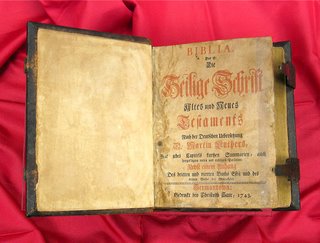Sauer & Son

Christopher Sauer (the Elder), a great-grandfather of mine, died on this day in 1758 in Germantown, Pennsylvania.
Born in 1695 in Ladenburg, Germany, Sauer worked as a tailor and spectacle-maker there until 1724, when he brought his wife and son to America in search of religious freedom. In Pennsylvania he became associated with the German Baptist Brethren church, a non-conformist, pacifist sect. After his wife, Maria, left him to join Conrad Beissel's Ephrata Commune as sub-prioress of the convent, Sauer buried himself in his work, first as a cabinet-maker, wheelwright and clockmaker, and eventually as the first successful German-language printer in the New World. His chief rival, Benjamin Franklin, had tried to reach the German-language market in Pennsylvania with his own publications, but failed largely due to the poor literacy of his German help. Nevertheless, Franklin controlled the paper supply in Pennsylvania; and at first he refused to sell paper to Sauer for his printing press (regarding German immigrants to be poor credit risks), but later relented when a wealthy German put his credit behind Sauer's enterprise. Like Franklin, Sauer published a daily almanac (aimed at the German readership), as well as numerous religious and pacifist tracts.
In 1742, Sauer published the first European-language Bible printed in North America; up to that time, not even an English Bible had been printed in America, as that was a privilege enjoyed only by the King's printer in England. In his later years, Sauer battled against Franklin's efforts to "anglicize" the religious German immigrants and bring them under secular political influences. Sauer's wife later left the Ephrata Commune and returned to Sauer, and his son, Christopher Sower, took over the printing business and became a leader among the German Brethren.
His only child, Christopher Sower the Younger -- born on tomorrow's date in 1721 in Laasphe, Germany -- became a minister in the German Baptist Church at the age of 32, but even as his role within the church became more important, he continued to assist his father in his printing business, taking charge of the English-language publications and printing the first religious periodical in America, the Geistliche Magazien (1764).
As the American Revolution unfolded, Sower the Younger came under fire for his pacifist beliefs, which were mistaken for loyalty to England, and in 1778 Sower was arrested by the Continental Army as a spy. His print shop and all of his worldly possessions were impounded, and to add insult to injury, the Army forcibly shaved Sower's beard, which had been one of the hallmarks of his religious practice. As church historian/one-time Pennsylvania governor Martin Brumbaugh observed, "Men in public life had cleanly shaven faces. It is interesting to note that every signer of the Declaration of Independence was smooth-shaven. The indignity heaped upon Sower was two-fold. When his beard was removed his religion was ridiculed and his face was made to appear like that of his oppressors."
Sower was eventually released, but his property was never returned, and Sower lived out the rest of his years with friends and relatives. In 1792, recognizing the mistake that the Continental Army had made in its treatment of the late Father Sower, the Pennsylvania legislature passed a law giving Sower's heirs whatever remained of his confiscated property -- by that time, a regrettably empty gesture.
Labels: Christian History, Colonial History, Family History





0 Comments:
Post a Comment
Subscribe to Post Comments [Atom]
<< Home